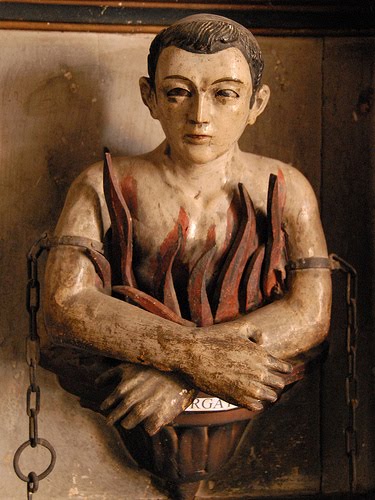TREATISE ON PURGATORY by St. Catherine of Genoa
CHAPTER VIII
THE NECESSITY OF PURGATORY, AND HOW TERRIBLE IT IS

Again I say that, on God’s part, I see paradise has no gate, but that whosoever will may enter therein; for God is all mercy, and stands with open arms to admit us to His glory. But still I see that the Being of God is so pure (far more than one can imagine), that should a soul see in itself even the least mote of imperfection, it would rather cast itself into a thousand hells than go with that spot into the presence of the Divine Majesty. Therefore, seeing purgatory ordained to take away such blemishes, it plunges therein, and deems it a great mercy that it can thus remove them. No tongue can express, no mind can understand, how dreadful is purgatory. Its pain is like that of hell; and yet (as I have said) I see any soul with the least stain of imperfection accept it as a mercy, not thinking it of any moment when compared with being kept from its Love. It appears to me that the greatest pain the souls in purgatory endure proceeds from their being sensible of something in themselves displeasing to God, and that it has been done voluntarily against so much goodness; for, being in a state of grace, they know the truth, and how grievous is any obstacle which does not let them approach God.
Reflection
We are want to think of the Heavenly Gates as the Heavenly Grates; bars that bar admittance. Rather, these gates are portico (not portcullis); openings that admit passage into a city, into a sanctum, into a place of rest. These porticoes will not be shut by portcullis (cf. Rev 21:25), but remain open precisely because the City of God was not created as defense against the primorial outside, as are the cities of earth, for there is only God and there is no other (Isa 45:22b). It was for the dwelling in this city that man was created, and the individual man was not created for the purpose of being barred from entrance into this city (cf. Isa 45:18-19a).
It is rather very much the voice of the devil that tells us that we will not be admitted, that the fiery sword that banishes us from Eden also banishes us from that City of Rest. But we were not created for Eden, but rather for Him. It is the devil that tells us that after our early life, we will find portcullises baring us from God, that our search for Him is a vain one. As soon as we can identify this voice and put the devil’s name to it, the sooner we will be able to differentiate the other, smaller voice that says Be converted to me, and you shall be saved (Isa 45:22a).
Yet, the damned will not enter this City, nor will those who are imperfect. The damned desire the City of God only from a position of the deadly sins (pridefully to rule it, gluttonously to consume it, enviously to dispossess those that have it, etc.) but do not desire to be citizens of the City. The imperfect will not enter into the City because they love it; nay because they love the One who is its King.
It is a certain type of pain to desire and never be able to obtain, to be rejected by the object of one’s desires, it is a congruent but different type of pain to realize that one’s own faults make one unworthy to obtain the object of their desire. The damned know that they are unworthy but prefer their faults and thus accept the hell of separation. Here, there is a sort of finitude to the infinite pain of separation, for the faults that the damned are fixed on, as a work of a creature, are finite and as finite merit not infinitude. The damned, seeking to know only their finite faults and not God, prefer infinite separation in finitude of suffering.
The imperfect, have a sort of infinitude to their finite pain of separation, for they see their faults as how God sees them; in how the faults offend His Merciful Heart, not from a narcissism of what the fault merits for the individual. The smallest of sins, of faults, is of infinite offense, and this is of infinite grief to the blemished and imperfect soul. The imperfect soul does not prefer separation from her Beloved but chooses finite separation, an infinitude of pain, a thousand hells, rather than that her imperfections remain.
Contemplation
Question: It is not just that God cannot accept imperfection into communion with Himself, but it is that a soul with imperfection will not allow herself to be in the presence of God. Consider how imperfection prevents full communion with God. Why then do we continue to choose actions that increase our imperfection and lessen our communion with God?
Question: An imperfect soul desires and chooses Purgatory and has no fear of the suffering there. What can we, who are in the wayfaring state, do to lessen our unfounded fears of Purgatory, fear that often get in the way of embracing God’s mercy and call to conversion?
~PPP
